In reflecting on her journey since ordaining as a Buddhist nun, Sister Tri Nghiem highlights the importance of a sense of family and belonging.
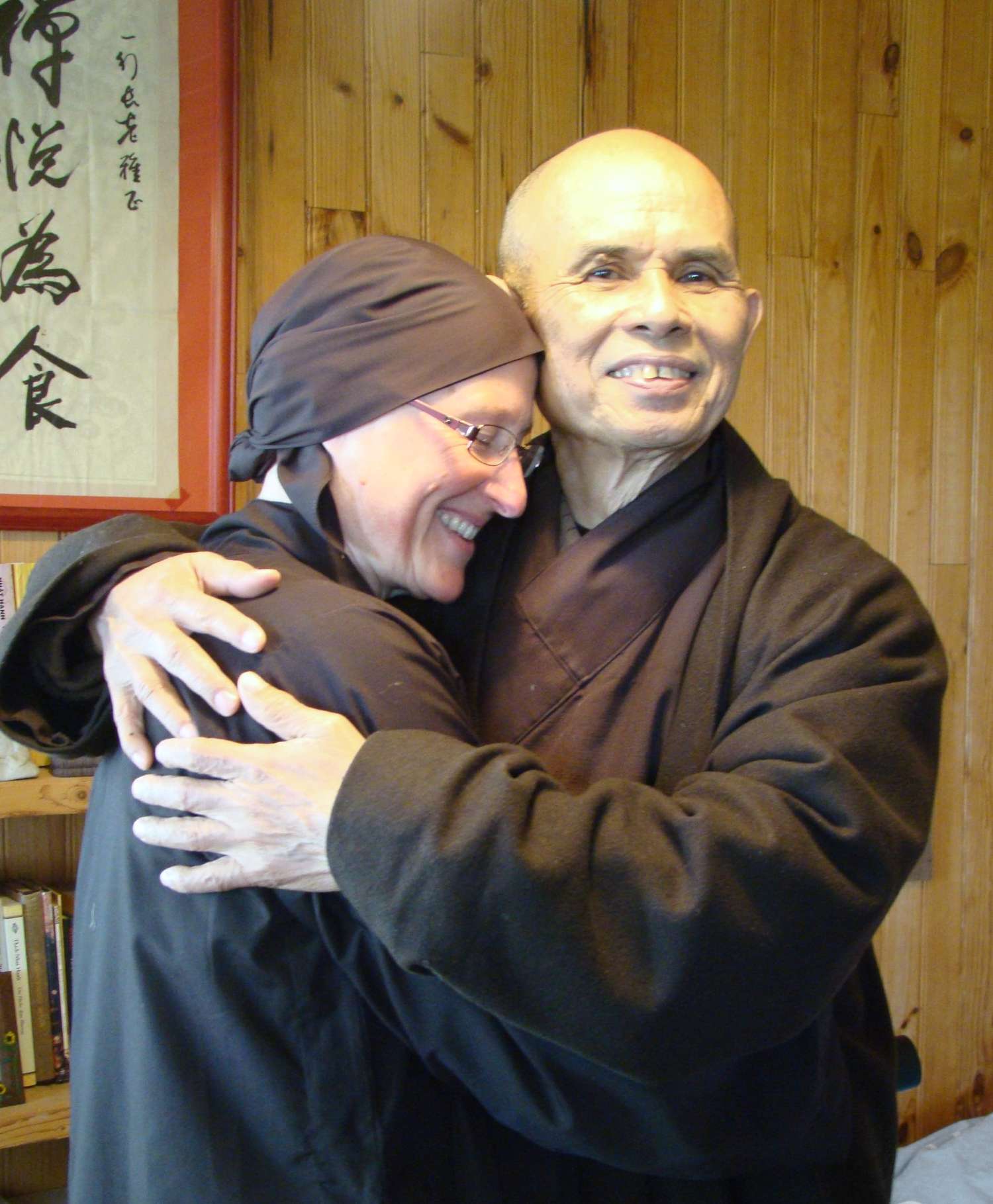
On a cold and windy yet bright and sunny day on March 8, 2009, Thay put his hand on my head, gave me his blessing, snipped a lock of my hair, presided over the ceremony while I took my vows and gifted me with the enduring legacy of my wonderful Dharma name: Adornment with True Holding. With this, I was officially born into the Golden Lotus family, along with nine others in the Still Water Meditation Hall of Upper Hamlet, Plum Village. Thirty-six Vietnamese siblings were born into monastic life at the same time in Tu Hieu Temple, Hue. This year, those of us still in robes celebrate thirteen years of monastic life. How time flies!
A year later, to mark our first anniversary and for the sake of posterity, one sister suggested we record the most memorable experiences of our first year in a little red imitation leather notebook she provided, which, rather unfortunately, disappeared shortly after and I have never seen it since. So much for recording the key moments of our monastic infancy for posterity! Yes, this was before the time when all memories were automatically saved to the cloud.
Yet, even without a record, I can still remember the feel of my account: it gushed with enthusiasm. I loved everything about my new monastic life. I loved my newly acquired extended family of hundreds from so many different cultures and continents. I loved our community of practitioners from around the globe. I loved the yearly schedule of retreats – with people from near and far, all seeking change in their lives. I loved the brotherhood and sisterhood, the walks and picnics we went on in the French countryside in springtime, treading softly on fresh, spongy grass dotted with a myriad of golden dandelions and tiny white daisies between rows of budding vineyards. I even remember loving the mid-summer Health Retreat—a fasting and hiking endurance test! We hiked along country roads with our resident health guru, Brother Phap Lu, in the scorching heat of August, our feet slowly dragging as our hot and thirsty, food-deprived and weakened bodies pushed on towards our destination. I clearly remember one conversation we had, passing by some rows of blackberry briars, “So how is monastic life treating you?” Br. Phap Lu inquired knowingly. “Well, I think I am still in the honeymoon phase,” I replied, afraid this may not have been quite the answer he was expecting. “Good!” he shot back. “Stay there!”
With or without the sound advice of Br. Phap Lu in those early days, my honeymoon phase went on to last a solid twelve more years.
Volition: the recipe for longevity
What has kept me on the path till now? The sangha’s love and my volition. My deep desire and determination to heal my own ancestral suffering, to break the cycle of intergenerational trauma, to transform my accumulated afflictions and to cultivate peace, joy, love and freedom in this lifetime, and to help as many others as I can along the way.
I do not know where this courage and determination came from, but I see it requires something of a warrior spirit–a willingness to face difficulties and suffering and not to run away from them. It requires a deep conviction and faith in the path in order to stay the course and overcome the many challenges that we inevitably encounter in monastic life. The more I practice, the more I recognize my shortcomings and difficulties. Alongside all the positive seeds Seeds are often used in the Plum Village tradition as a way of describing all the potentialities of our mind.that I am happy to embrace and call my own, I carry more problematic seeds deep within me that I try to avoid, and pretend are not mine. Sooner or later though, they manifest, and I must face them. Seeds of fear. Seeds of discrimination. Seeds of judgment. Seeds of anger. Seeds of doubt. And seeds of despair. The path of awakening inevitably leads us down this road and there is no escape.
The importance of a sense of belonging
I was born as the youngest child into a small nuclear family of five–my parents, my two elder siblings and I. We lived in a small country town, far away from grandparents and relatives in the city. I rarely saw my grandparents. I barely knew my three cousins. My sense of family was small and tenuous. This all changed dramatically when I was ordained. Quite unexpectedly, my “family” suddenly expanded and multiplied.
First, I was born into an ordination family of forty-six. The ten of us who were in Plum Village, France, would sit together for lunch on monastic days and share deeply about what was going on in our hearts. Then, I shared a room with three other sisters and no matter how often we changed rooms, there were always three other sisters and sometimes even four, all crowded head-to-toe into tiny rooms–an inescapable experience of togetherness!
With the act of shaving my head, I suddenly belonged to so many different families. The family of my room-mates, my cooking rotation, the Care Taking Council, and our little family of mentees, all gathered together around our wise and compassionate mentor for weekly sessions of deep sharing, laughter, and sometimes tears. Next came the retreat organizing teams and Dharma sharing families. The “ten directions” family of brothers and sisters were a group loosely defined by the fact that we all spoke English. Many were from the West, but as our sangha demographic changed, we were joined by siblings from Indonesia, Japan, Malaysia, and other Asian countries, as well as the occasional Vietnamese sibling or those who had grown up in the West. The “ten directions” group of Advent enthusiasts in the weeks before Christmas, the Plum Village monastic choir, and finally, the blood relatives of my monastic brothers and sisters who, by default, became my siblings and parents, too.
Families within families within families–a never-ending network of connections. So many opportunities to belong. I felt rich and blessed. I enjoyed a sense of belonging and community I had not known before in my life. Day by day I became lighter and more joyful. I started to glow as the light of love, compassion and acceptance in me grew.
The joys of siblinghood
I loved my international sangha of brothers and sisters in Plum Village. Everybody was so helpful, friendly, welcoming, accepting, kind, and smiling. I felt accepted and embraced by everyone. I made many mistakes and was unskilful many times, but I was always forgiven and accepted. I felt there was love and respect and an openness in our community; an acceptance of difference.
When I ordained, there were about 40 sisters in Lower Hamlet, eight of whom were from Western countries. Because we shared a common language and similar cultures, I bonded with them naturally and easily. We spent a lot of time together, going for walks, eating meals together, singing and playing music or even dancing to traditional French folk music on the slippery wooden floor of the Dharma Nectar Hall, amid peals of laughter as we struggled to master the rapid steps and turns.
For many years, on lazy days in cold winter months, we would huddle around the stove in the Dharma Nectar Hall to eat breakfast, talk, laugh, and share stories, forever hoping the fire’s feeble heat would eventually warm our freezing limbs.
In warmer months, we would gravitate to the Old Bell Tower for picnic lunches, sharing goodies that friends or family had sent. The same group would gather behind the Dharma Nectar Hall every June as we celebrated my birthday amid an abundance of happy faces, small gifts, green leaves and grasses and delicate wildflowers. It was an exciting, joy-filled time of discovery and bonding with a wonderful family of inspiring and engaged Western nuns–I felt happy, loved, and embraced. I felt I belonged.
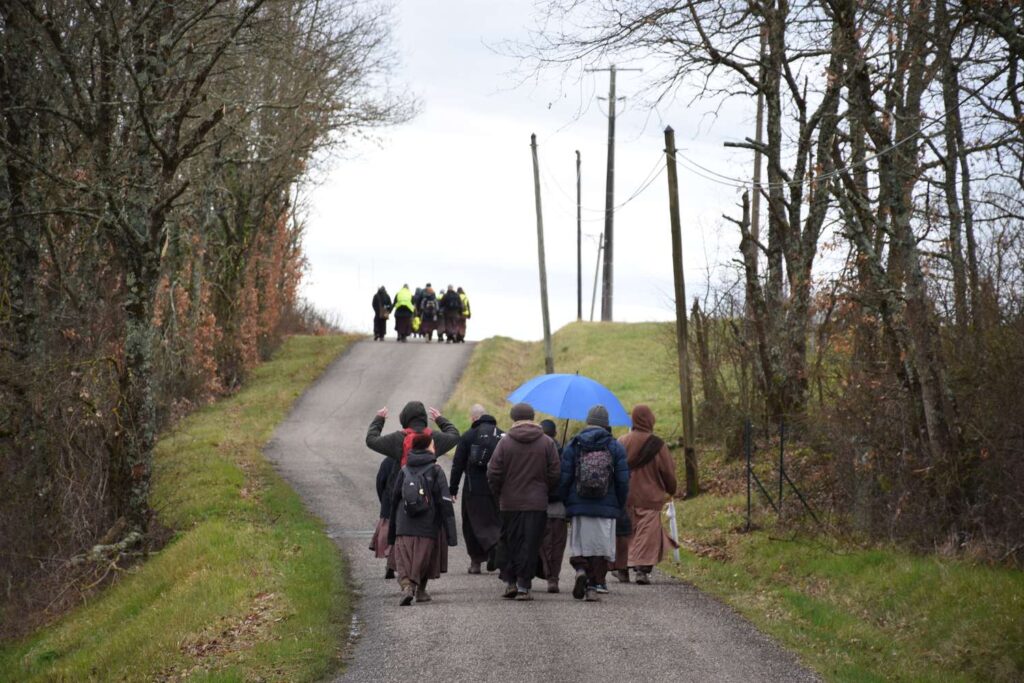
Taking up a new challenge
Twelve happy years passed without any major challenges. In March 2019, I moved to Magnolia Grove Monastery in Mississippi, USA, in order to explore life in a smaller, Vietnamese-speaking community. Not many understood this choice, but I wanted to deepen my practice, learn more about community life and immerse myself in Vietnamese language and culture. At the same time, this was an opportunity to reconnect with my own cultural roots. While not exactly the same, American culture has many things in common with my original Australian heritage. It was the first time in almost forty years that I had lived in an English-speaking environment, having left Australia when I was only twenty-two to move to Switzerland. I enjoyed the ease of connection with our U.S. friends, and felt the excitement of a new beginning.
Magnolia Grove Monastery stands on 120 acres of wooded land and sprawling lawns. The woods are home to squirrels, raccoons, possums, deer, rabbits, armadillos, and birds of all kinds, including the ever-present ravens with their distinctive, plaintive calls, striking turkey vultures and majestic eagles. By day, the woods echo with the sound of red-crested woodpeckers and at night the hooting of owls. In springtime, birds of all colours hop about on our lawns and nestle in our trees: amongst others brown thrashers, blue jays, flaming red cardinals, and brilliant southern yellow finches.
Although numbers fluctuate, the Magnolia sangha is a small and cozy family of about 20 sisters and, until recently, 10 brothers. All the sisters live together in one house, which has the comforting feel of a family home. It was a wonderful new experience for me to discover our extended family of local American and Vietnamese friends who support our sangha–they visit regularly and nourish us with their generous smiles, helping hands, and the tasty dishes they offer. In my first year here, we went for day trips to nearby Sardis Lake and were taken out on friends’ boats. We picnicked, swam in the lake, went for walks along the beach, napped in hammocks slung between pine trees, played music and built brotherhood and sisterhood. Once again, I felt a wonderful sense of family and belonging.
Then along came COVID-19. Suddenly my world constricted.
COVID-19 changed everything
In order to protect the health of our sangha, we closed our center to the public in March 2020. We remained closed for more than a year until July 2021. After two months of welcoming guests and a smaller-than-usual summer retreat, the Delta variant arrived, so we decided to close the monastery again.
My heart sank. I missed the contact with our lay friends. Although I had helped with many online retreats and weekly practice sessions throughout the year, it did not satisfy my deep aspiration to help all beings cross to the other shore!
For the first time in my monastic life, I began to question my sense of purpose.
The importance of a sense of purpose
As for many others, the last two years of closures and lockdowns left their mark on me. Five months spent (unvaccinated) in a small house in Houston, Texas, added to my sense of disconnection and isolation. Occasional Zoom calls, online retreats and weekly online sessions alleviated some of my felt sense of isolation but did not fulfil my need for more human contact and face to face interaction.
Existential questions began to arise: Who am I and what am I here for if our monastery is closed?
If I cannot be in contact with lay friends, how can I realize my deep aspiration–and help realize our teacher’s aspiration–of healing the world? Of bringing Buddhism to the West? Of facilitating a collective awakening?
For the first time in my monastic life I felt deeply challenged and alone.
An endangered species?
When I ordained, there were about forty Western brothers and sisters older than me in the sangha – roughly twenty of each. I never questioned their existence, and never imagined that one day they might not be there. It seemed so normal, and I took them for granted, the way a child naively thinks its parents will never die.
Over the years, though, I witnessed the departure of so many Western siblings – both older and younger. It was often excruciatingly painful for me but with time I came to accept that this was not the right path for everyone and certainly not an easy path for anyone, no matter what their origin.
Right now, above me in ordination age there are only eight other Western sisters and about ten Western sisters who come after me, in our worldwide Sangha of about four hundred nuns. Two thirds of all Western sisters have left our sangha. I have begun to feel that Western nuns have become an endangered species, soon to become extinct.
Why is this so? What are the conducive conditions for Western women to want to ordain into our community, and then what are the “sufficient conditions” for them to stay? I realize the answer varies for each individual–everyone is different and has a different story, a different background, different needs, and is in a different place in their lives–however, I continue to hold this question in my heart.
Taking stock
Looking back at my monastic life and reflecting on what has kept me here so far, I see there are a number of reasons, not just one.
My strong volition, yes. My Bodhicitta, yes. But also, my good-enough health. My outgoing nature. My joy of connecting with others. My ability to see the beauty in all people and cultures and accept differences, accept otherness. My resilience. My capacity to tolerate frustration and slowness of change. My faith in the practice, my faith in our teacher and in our community. My love and gratitude towards the sangha in general and towards my siblings in particular.
However, without an open, welcoming, and compassionate sangha this would not be enough. Without the unconditional love of the sangha, I could not grow and flourish. The sangha is truly a bright and radiant jewel. Collectively, the sangha can provide what most individuals cannot: true love–spiritual friendship, compassion, loving kindness, equanimity and inclusiveness. To this list our teacher added reverence and trust, and I would like to add: space and time. The sangha has given me space and time to be, to grow, to become, to learn, to transform.
The joy of monastic life
Recently I found myself talking about the trials and tribulations of monastic life to a guest who had expressed interest in pursuing a monastic path. Once more, I found myself gushing with enthusiasm. “Where else can you focus exclusively on what is most important to you in life?” I asked rhetorically and then, true to form, answered for them.
The sangha is made of a collection of individuals, and just as no one individual is perfect, the sangha is also not perfect. We all have our blind spots, our areas of resistance, our unhealed traumas, oftentimes passed on to us by our ancestors and society, and the sangha is no different. Is practising in the sangha enough to be happy? Enough to transform our afflictions? Are conditions sufficient for us to grow and heal? To flourish?
For myself, I have found that the practice of mindfulness as transmitted by our extraordinarily accomplished and compassionate teacher, embedded in an open, evolving, loving and supportive monastic community, was the way to achieve everything I was seeking in life. Till today, I still hold this to be true, and feel incredibly blessed. My gratitude overflows.


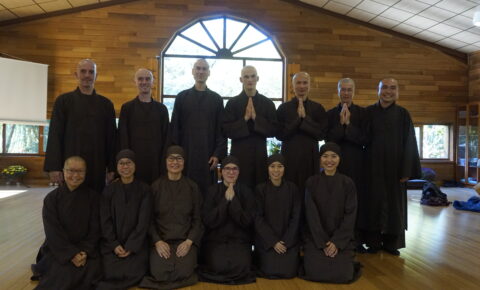
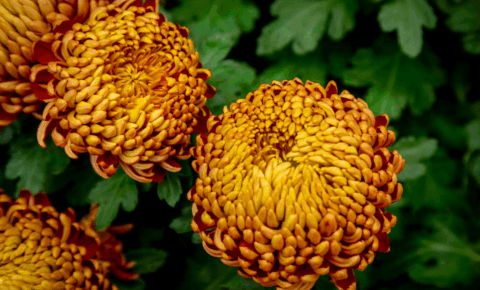
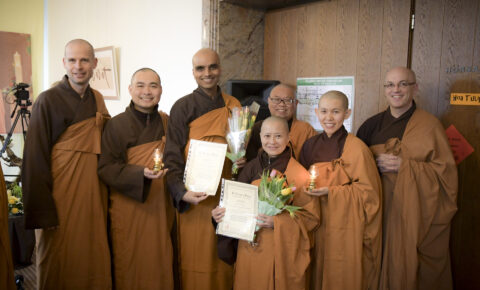
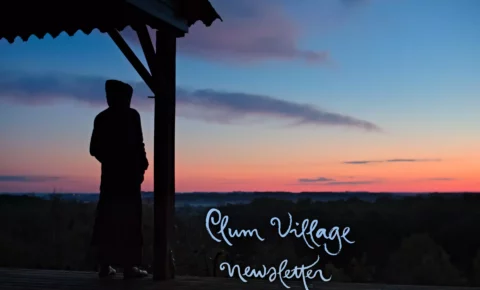
Share Your Reflections